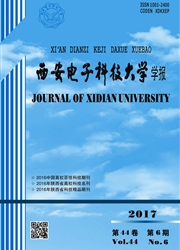

 中文摘要:
中文摘要:
针对无线网络中的路由协议以被动方式处理网络拥塞,可能导致更多的数据丢失、更长的时延和更大的网络开销问题,提出了可用于认知网络的具有业务感知能力的路由协议(Traffic—Aware Cognitive Routing,TACR).TACR通过应用基于维纳过程的预测方法,利用局部探测信息使节点快速、准确地感知到网络中业务状态的变化,从而优化了网络路由,均衡了网络负载.同时,TAcR引入分布式Q学习算法,根据网络状态自适应地调整路由生存期,提高了路由对业务分布的自适应性.在合理的开销下,对典型场景中TACR的性能进行分析,证明了TACR性能的优越.仿真结果表明:在重负荷时,与已有协议对比,TACR的平均端到端时延减小约40%,丢包率降低约10%,网络开销减小约27%.
 英文摘要:
英文摘要:
In existing routing protocols for wireless networks, congestion control schemes are taken into consideration only after congestion has happened, and these reactive manners may result in more packets loss, longer end-to-end delay and more overhead. This paper proposes a traffic-aware routing protocol (TACR) which can be used in cognitive wireless networks. By the use of prediction methods based on wiener processes and local probe information, TACR perceives traffic state changes quickly and accurately, thereby optimizing network routing and effectively balancing the network load. Meanwhile, distributed Q- learning mechanism is introduced into TACR to dynamically adjust the route lifetime according to network conditions, and the routing adaptability for traffic distribution is improved. Under the reasonable definition of network overhead, we analyze the performance of TACR in the typical scene, and prove its superiority. Simulation results show that the TACR routing protocol shortens the average end-to-end delay by 40 %, reduces packets loss by 10M and network control overhead by 27% compared with the existing routing protocol in heavy load environments.
 同期刊论文项目
同期刊论文项目
 同项目期刊论文
同项目期刊论文
 Bandwidth-Aware High-Throughput Routing With Successive Interference Cancelation in Multihop Wireles
Bandwidth-Aware High-Throughput Routing With Successive Interference Cancelation in Multihop Wireles Energy Ef?ciency and Delay Tradeoff in Device-to-Device Communications Underlaying Cellular Networks
Energy Ef?ciency and Delay Tradeoff in Device-to-Device Communications Underlaying Cellular Networks Optimal Rate Allocation Based on Cross-Layer Design and End-to-End Congestion Control in WCDMA Netwo
Optimal Rate Allocation Based on Cross-Layer Design and End-to-End Congestion Control in WCDMA Netwo Energy-Ef?cient Subcarrier Assignment and Power Allocation in OFDMA Systems With Max-Min Fairness Gu
Energy-Ef?cient Subcarrier Assignment and Power Allocation in OFDMA Systems With Max-Min Fairness Gu Joint spectrum-ef?cient routing and scheduling with successive interference cancellation in multihop
Joint spectrum-ef?cient routing and scheduling with successive interference cancellation in multihop Efficient Link Scheduling with Joint Power Control and Successive Interference Cancellation in Wirel
Efficient Link Scheduling with Joint Power Control and Successive Interference Cancellation in Wirel End-to-End Delay Distribution Analysis for Stochastic Admission Control in Multi-hop Wireless Networ
End-to-End Delay Distribution Analysis for Stochastic Admission Control in Multi-hop Wireless Networ 期刊信息
期刊信息
